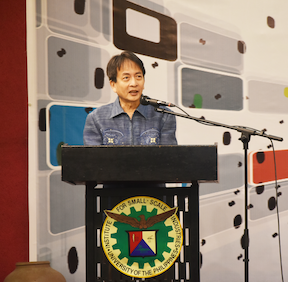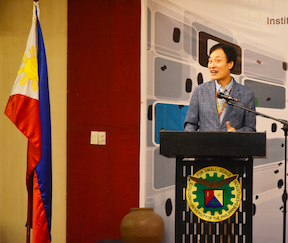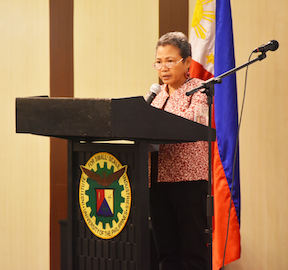2019 ASIP Manila Conference
Recognizing the critical role technology and innovation play in the small and medium enterprise (SME) sector, the University of the Philippines Institute for Small-Scale Industries (UP ISSI) collaborated with the Asian Society for Innovation and Policy (ASIP) in holding an international conference on “Technology and Innovation for SMEs” on October 3-5, 2019.
The Conference aimed to create a space for the exchange of knowledge and experiences on the impact and importance of technology and innovation to the SME sector.
The Opening Ceremony, moderated by UP Diliman Vice Chancellor for Research and Development Fidel R. Nemenzo, was held at the International Center for Public Administration (ICPA) at the National College of Public Administration and Governance in UP Diliman.
Setting the tone of the two-day event, UP Diliman Chancellor Dr. Michael L. Tan, in his welcome remarks, emphasized the role of the academic community in providing the fuel for innovation in the SME sector.

He then shared some of UP’s initiatives in helping SMEs, such as: (1) the use of RFID among small vendors in the campus, which allows cashless transactions through the use of smart phones; (2) research and development in modernizing the clothing industry by reviving the entire textile industry to support our farmers, weavers, and manufacturers; and (3) collaborating with the government in its e-jeepney project.
ASIP President Prof. Sung-Soo Seol, meanwhile, gave a brief overview on ASIP, saying the first conference was organized by seven scientist-scholars from the Science City of Korea in 2010. The Philippines is the 6th country where ASIP conference is held; next year it will be held in Cambodia. Prof. Seol said ASIP conference is aimed at highlighting the importance of innovation for the continued growth and development of society, the different aspects of innovation, challenges/barriers, and good practices within the region.

The keynote speeches that followed focused on the Korean and Philippine experiences in driving innovation and technology advancements, highlighting important insights, lessons learned and ways to move forward.
Prof. Ky-young Park of Sunchon University emphasized that developing countries should not follow the industrial development process of developed countries since most of them grew during the second industrial revolution and we are now in the fourth industrial revolution era. She said governments need to invest in innovation and technology absorption as these are fundamental drivers of economic growth in both advanced and emerging economies.
Prof. Youngil Park of Ewha Womans University identified four important factors that drive innovation and industrial development: (1) willingness of SMEs to innovate; (2) enhancement of national intelligence capabilities and infrastructures; (3) creating an enabling environment in terms of policies and programs; and (4) establishment of mechanism for international cooperation.
Reinforcing Prof. Park’s third point on the need to create an enabling environment, Prof. Jung-Wha Han of Hanyang University explained that an innovative startup ecosystem requires an expansion in the market, increase in investments, support in technology commercialization, promotion of fair trade system, reduction in the cost of failure, and the enhancement of entrepreneurial capabilities.
Meanwhile, Korean Institute of Science and Technology Information President Dr. Hee-yoon Choi zeroed in on the importance of data-based support for SMEs, saying government and private institutions should work on improving data reliability, active use of supercomputing, and the provision of intelligent analysis service.
In his message read by UP ISSI Director Aleli B. Bawagan, Director Jerry Clavesillas of the Department of Trade and Industry, highlighted the country’s “Inclusive Filipinnovation and Entrepreneurship Roadmap“, saying this will activate innovation and entrepreneurship as the main levers to reduce, if not completely eliminate poverty in the country.

Usec. Brenda L. Nazareth-Manzano of the Department of Science and Technology (DOST), meanwhile, enumerated the DOST’s programs that are geared towards strengthening the country’s human capital, providing enabling environment for innovations through the establishment of facilities, and coming up with policy framework, which would cultivate the culture of innovation in the country and engage the people in innovation-related endeavors.
The breakout sessions that followed were held at the UP ISSI and tackled the conference’s sub-themes such as Management of Technology, Technology Policy, Entrepreneurship Education for SMEs, SME Policy, Future of SME & Startup Ecosystem and National R&D Investment: Its Adequacy and Implementation, among others.
Report from ASIP documentation team
Related articles:
ISSI Shares Innovative Approaches to Entrep Educ, Farm Tourism
Millennials at work: UP Students Present Innovations for a Sustainable and Healthier Society
Recap of 2019 ASIP Manila Conference on “Technology and Innovation for SMEs”
Disclaimer: The views expressed herein or in any article in the UP ISSI website are those of the authors and do not necessarily reflect the policies or opinions of UP ISSI nor the views of the University of the Philippines. Regarding Accuracy of Information and Usage of Data: Visitors and users of the UP ISSI website are advised that information contained within the website is assumed to be accurate. However, errors can occur even with computer-generated information. UP ISSI makes no representation regarding the completeness, accuracy, or timeliness of such information and data, or that such information and data will be error-free. Visitors are encouraged to review the official version of all documents on which they plan to rely on.